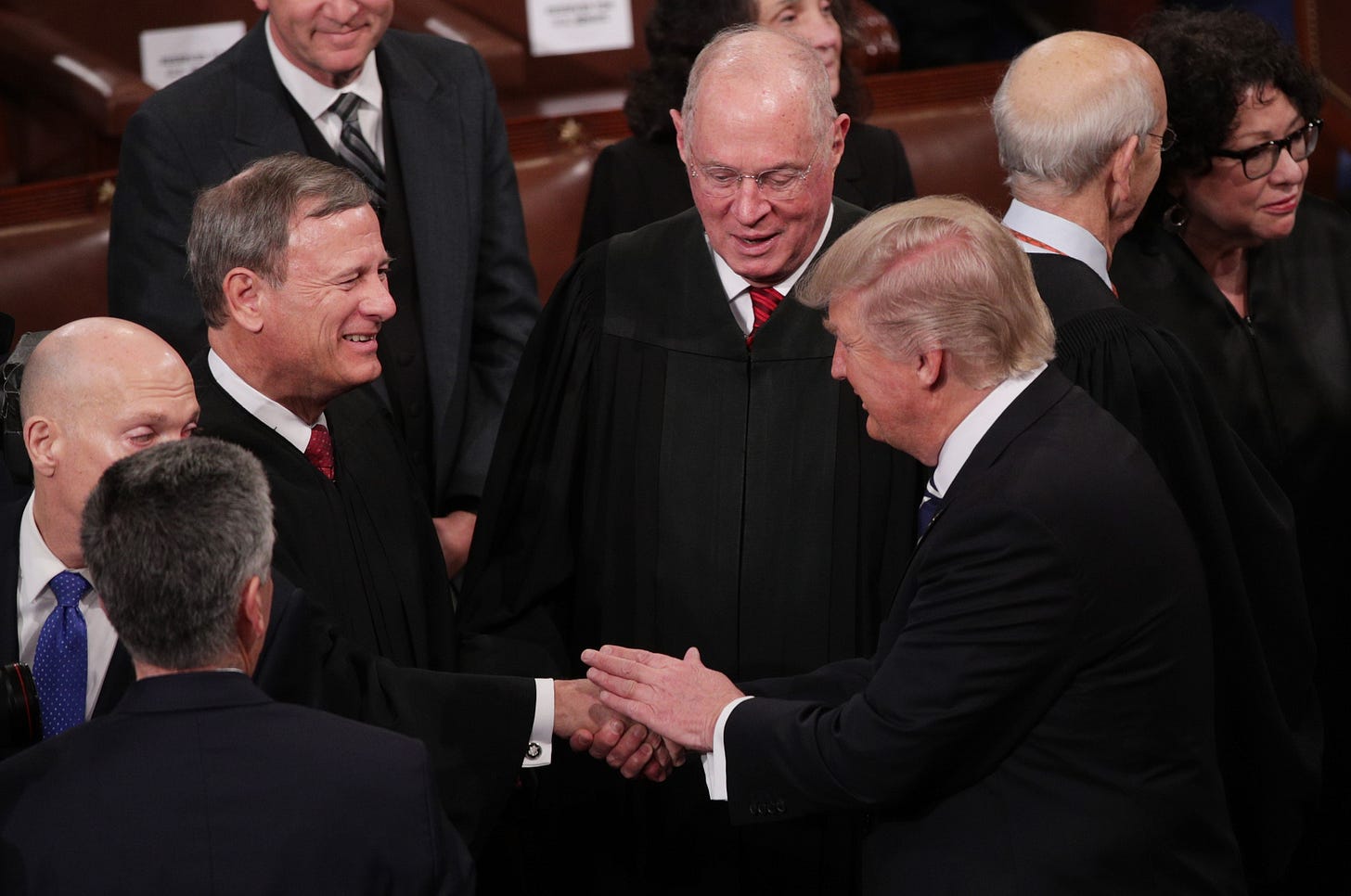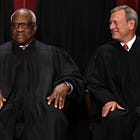Trump uses immunity ruling to try to blow up his conviction
And thanks to the Supreme Court's right-wing nihilists, it just might work.
This free edition of Public Notice is made possible by paid subscribers. If you aren’t one already, please sign up to support our independent journalism.
On July 1, the last day of the Supreme Court’s term, six conservative justices took a sledgehammer to democracy. Henceforth, presidents can use their power to commit actual crimes with impunity.
The ruling is likely to prove fatal to the election interference case in federal court, with Trump able to exclude virtually everything he did relating to the election by arguing that it was part of his official presidential duties. But the immunity ruling also threatens to blow a hole in his New York state criminal conviction, which was secured in part with evidence of Trump’s conduct in the White House.
Indeed, Trump has already moved to dismiss his false business records case, or, in the alternative, to vacate the jury’s verdict.
The farcical immunity ruling
The backstory here is the Supreme Court’s ruling in Trump v. US, where the right-wing majority invented an executive immunity that would have horrified the framers they claim to exalt.
When the case was argued before the DC Circuit, Judge Florence Pan cornered Trump’s lawyer D. John Sauer with the hypothetical of a president who uses SEAL Team 6 to kill a political rival. Sauer gamely insisted that a president who was not impeached and convicted by the House and Senate for dispatching the military to carry out an assassination, an act that is incontrovertibly official, could never be prosecuted. Legal observers scoffed at the self-own, and yet the Supreme Court more or less endorsed this radical position.
Under Trump v. US, the president enjoys absolute immunity for acts within his conclusive and preclusive authority (pardons, judicial appointments, foreign treaties), and presumptive immunity for all other official acts (presidential communications).
Importantly, the Court even went so far as to bar the introduction of evidence of official acts in criminal cases, reasoning that “if official conduct for which the President is immune may be scrutinized to help secure his conviction, even on charges that purport to be based only on his unofficial conduct, the ‘intended effect’ of immunity would be defeated.” Testimony from his advisers and “private records of the President” are specifically excluded, on the theory that they might “invite the jury to inspect the President’s motivations for his official actions,” which would be “highly intrusive” and “‘seriously cripple’” the president’s “exercise of his official duties.”
It’s hard to see how the January 6-related federal charges will survive this ruling, resting as they do on testimony from Mike Pence, Mark Meadows, and other White House officials about the events leading up to the attack on Congress. But the ruling also threatens to undercut the false business records case, even though that case involved the purely personal act of paying off Stormy Daniels to keep quiet about a sexual encounter and then creating false business records to hide the reimbursement to Michael Cohen.
Trump’s arguments *aren’t* crazy (only thanks to SCOTUS)
On July 10, Trump filed a motion to vacate his conviction on the theory that the court wrongfully admitted evidence of his official acts.
That evidence included: testimony by White House aides Hope Hicks and Madeleine Westerhout; Trump’s tweets while in office; his official financial disclosures; and communications with Cohen about a public response to a complaint to the Federal Election Commission. Trump even went so far as to demand the dismissal of the indictment itself, on the theory that improper evidence was presented to the grand jury.
The motion began with the usual hyperbolic bluster that characterizes all Trump’s legal filings.
A note from Aaron: Working with brilliant contributors like Liz requires resources. If you aren’t a paid subscriber, please click the button below to support our work.
“No President of the United States has ever been treated as unfairly and unlawfully as District Attorney Bragg has acted towards President Trump in connection with the biased investigation, extraordinarily delayed charging decision, and baseless prosecution that give rise to this motion,” his lawyers howl, accusing the prosecutors of participating in “concerted — yet unsuccessful — efforts to hinder President Trump’s leading campaign in the 2024 Presidential election and to restrict the constitutionally protected political speech of President Trump and the American people.” (Note that, since she became the presumptive nominee, Trump has switched from accusing Biden of secretly controlling his criminal cases, to claiming it was Vice President Harris.)
The motion also accuses the prosecution of rushing to trial before the immunity issue could be resolved by the Supreme Court — an ironic claim in light of Trump’s prior ranting that prosecutors deliberately delayed charging him until the eve of the election.
Superficially, some of Trump’s arguments aren’t crazy. Hope Hicks was a White House adviser, and she did testify that Trump directed her response to the Wall Street Journal story in 2018 about the hush money payments, including his expression of relief that the story was coming out after the election rather than during the campaign. Similarly, Westerhout testified about the circuitous route the reimbursement checks took to get from the Trump Organization in New York to the White House, where Trump signed them.
Trump’s tweets about the hush money contract and payments to Michael Cohen would appear to be purely personal conduct, and thus admissible as evidence. But in Trump v. US, the Court held that his tweets about January 6 might be official acts and sent the issue back to the trial court for a “factbound analysis” considering the “full text and context” of each post. This muddied the waters sufficiently that Trump can colorably claim that the Cohen tweets were part of his official duties.
And filing the financial disclosure, known as OGE Form 278(e), was clearly an official act, which prosecutors submitted as evidence that Trump knew about the hush money payment to Daniels and lied about the reimbursement. (He originally omitted it, then disclosed it as a debt of $100,000-$250,000. In fact, he paid Cohen $420,000.)
So Trump’s immunity arguments aren’t crazy. But the Supreme Court’s immunity ruling is CRAZY, and Trump’s attempt to use it to blow up all four of his criminal cases is the inevitable result.
Prosecutors respond
The DA filed its response last Thursday. Their primary retort was that Trump waived most of these immunity claims by failing to raise them in timely fashion.
The deadline for motions in limine was February 22, and Trump filed a motion to delay his trial and exclude the Twitter posts and the OGE disclosure on March 8. Justice Juan Merchan denied that motion as untimely, since the deadline had passed. Trump never objected to the testimony of Westerhout or Cohen on immunity grounds, and only lodged an immunity objection to Hicks’s testimony during the trial itself.
Secondarily the prosecutors argue that had Trump raised the immunity objections in timely fashion, they would have been rejected under the rubric set out in US v. Trump itself.
“The four Tweets objected to by defendant were all issued in defendant's unofficial capacity,” they write, adding that “Defendant's Tweets conveying his personal opinion about his private attorney do not bear any conceivable relationship to any official duty of the Presidency.”
Hicks’s testimony was about the hush money scheme, which was categorically personal and not official, they insist, adding that the OGE form was a public record of an official act, not the act itself.
And moreover, they argue that the court’s error, if there was any, was harmless “in light of the overwhelming evidence of defendant's guilt.”
[B]ecause the narrow categories of evidence that defendant complains about here were all cumulative of extensive other evidence that is not even colorably subject to the Supreme Court's recent immunity ruling, there is no reasonable possibility that the limited evidence discussed above (even assuming that it should have been excluded) meaningfully contributed to his conviction.
Trump’s lawyers seek to read some kind of special status into the evidentiary exclusionary rule magicked up by six Supreme Court justices. They claim that it is definitionally prejudicial to admit evidence of official acts — never mind that the primary reason for the rule is not to prevent jury bias, but to ensure that the sitting president won’t be too hesitant to commit possible crimes.
In Trump’s telling, even if he didn’t raise the objection in timely fashion, presidential immunity is so powerful that it doesn’t have to be asserted — that’s how he gets away with claiming that the grand jury indictment must be dismissed, although he never made any such claim when it was rendered. There’s no passage in the Supreme Court’s ruling that supports such a claim. But there was no precedent or constitutional basis for the immunity ruling either, and the Supreme Court was willing to invent one so … ¯\_(ツ)_/¯
Trump was originally scheduled to be sentenced July 11. That hearing is now tentatively rescheduled for September 18, pending resolution of the immunity motion.
Despite Trump’s constant complaints, Justice Merchan bent over backward to be fair to the former president. In fact the trial was delayed a month while Trump’s lawyers litigated a facially spurious claim of prosecutorial misconduct. But if the Supreme Court had said beforehand “Oh, hey, presidents are kings now!” and if Trump’s lawyers had asserted those objections in timely fashion, it’s pretty likely that some of the evidence produced at trial would have been excluded. So it’s entirely possible that the judge may vacate the jury’s verdict, just to err on the safe side. And if he doesn’t, the appellate panel might do it anyway.
This is the mess that the supposedly moderate Chief Justice Roberts made in his zeal to protect the former president. And this is why the Trump team said that the decision was “like Christmas.”
But if Justice Merchan does invalidate the jury’s verdict, he could set a new trial date for the fall. How about, say, October 15?
That’s it for today
We’ll be back with more Wednesday. Appreciate this edition? Then please support our independent journalism by signing up. Just click the button below. Paid subscribers make PN possible.
Thanks for reading.








This is ridiculous. He started this when he wasn’t even elected!
Thanks!
Regrettably, SCOTUS immunity ruling is first salvo of Project 2025; reform or SCOTUS a must! Whitehouse for Judicial Committee Chair!